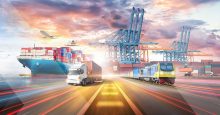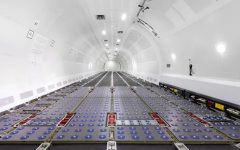 The European Union’s new customs pre-arrival safety and security system – Import Control System 2 (ICS2) – will introduce a new process for entry of goods by maritime and inland waterways, road and rail in the EU as of 3 June 2024. This is the third phase or release of the implementation of the new system that will extend safety and security data reporting requirements to all modes of transport. Similar requirements already went into force for air transportation of goods.
The European Union’s new customs pre-arrival safety and security system – Import Control System 2 (ICS2) – will introduce a new process for entry of goods by maritime and inland waterways, road and rail in the EU as of 3 June 2024. This is the third phase or release of the implementation of the new system that will extend safety and security data reporting requirements to all modes of transport. Similar requirements already went into force for air transportation of goods.
With this third release, maritime and inland waterways, road and rail carriers will also need to provide data on goods sent to or through the EU prior to their arrival, through a complete Entry Summary Declaration (ENS). This obligation also concerns postal and express carriers who transport goods using these modes of transport as well as other parties, such as logistics providers. In certain circumstances, final consignees established in the EU will also have to submit ENS data to ICS2.
Traders are strongly advised to prepare in advance for Release 3 to avoid the risk of delays and non-compliance. Affected businesses will be required to make sure they collect accurate and complete data from their clients, update their IT systems and operational processes, and provide adequate training to their staff. From 11 December 2023, traders will also need to successfully complete a self-conformance test before connecting to ICS2, to verify their ability to access and exchange messages with customs authorities.
EU Member States will grant authorisation, upon request, to the affected traders to gradually connect to ICS2 within a time-limited deployment window. Member States can grant the deployment window anytime within the following timeframes: from 3 June 2024 to 4 December 2024 (maritime and inland waterway carriers); from 4 December 2024 to 1 April 2025 (maritime and inland waterway house level filers); and from 1 April 2025 to 1 September 2025 (road and rail carriers). If traders are not ready on time, and do not provide the data required under ICS2, goods will be stopped at the EU borders and will not be cleared by the customs authorities.
Breaking News
- ‘Kerala, Telangana, UP have seen huge domestic cargo & warehousing growth’
- Saudia Cargo extends WFS handling partnership across Europe & US
- AEI secures DGCA approval for 737-800SF conversion
- Air cargo rates climb as peak season builds, though volatility eases: WorldACD
- IATA Survey shows strong industry momentum behind ONE Record
- Softlink Global unveils next-gen AI & automation capabilities
- Cargo Flash, RwandAir Cargo partner to boost digital efficiency
- GSV, Amazon sign MoU to boost express deliveries across India
- ‘Freighter shortage becomes a critical industry challenge’
- ‘India needs freighters to power Its export surge’
- ‘India needs modern freighters to meet 2030 cargo ambition’
 Cargo Breaking News
Cargo Breaking News


